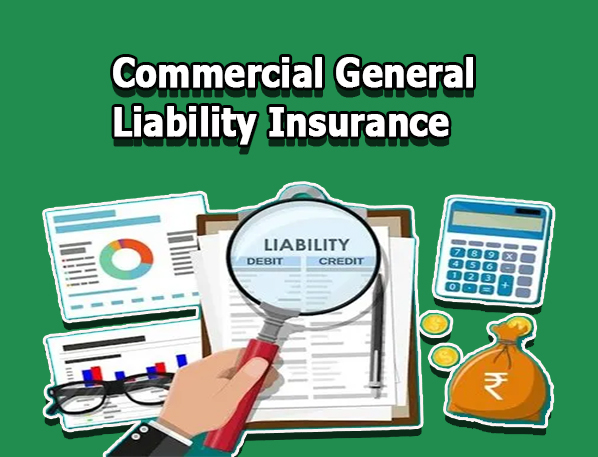Commercial general liability (CGL) insurance is a crucial policy for professionals like consultants, retailers, contractors, and skilled tradespersons to protect their company. In addition to hurting your company’s finances, lawsuits against you could harm your reputation among clients and consumers. Safeguarding your operations requires you to understand the risks your business faces and to have the appropriate CGL coverage to protect you from those risks.

Commercial general liability insurance covers property damage, personal injury, and bodily injury resulting from operations, products, or premises-related accidents. Furthermore, this coverage is considered comprehensive business insurance, although it doesn’t cover all liability risks a business may encounter.
Types of Commercial General Liability Insurance
A type of all-inclusive insurance known as commercial general liability insurance protects against losses or injuries brought on by a company’s activities, goods, or property. CGL policies are divided into two types: occurrence policies, which require events to occur within a specific timeframe, and claims-made policies, which cover claims regardless of event timing.
Claims-Made
A claims-made policy covers claims that arise and are reported within a specific time frame. In addition, claims filed after the policy’s expiry date will not be compensated if the policy is canceled or the premium is not paid.
Occurrence policy
An occurrence policy protects a company from any covered incident that occurs during the policy period, regardless of when a claim is made. As long as the incident happens within the time frame specified by the original policy, this kind of insurance will cover a business even if the claim is submitted after the policy is canceled.
What Does Commercial General Liability Insurance Cover
A CGL insurance policy typically covers defense expenses and damages if you are found at fault. Common liability suits can significantly impact businesses, making CGL coverage a crucial insurance product due to its potential negative impact. Furthermore, coverage offered by CGL consists of:
Bodily Injury and Property Damage Liability
Insurance policies offer protection against losses resulting from the insured’s legal liability for property damage or bodily injury to third parties due to non-professional negligence or business operations. Even when there is no physical harm, mental and emotional distress can still be classified as bodily injuries.
Personal and Advertising Injury
Personal and advertising injury liability safeguards an insured against liability for offenses. These include libel, slander, false arrest, copyright infringement, malicious prosecution, advertising idea misuse, and wrongful eviction or invasion of privacy.
Medical Payments
Medical payments coverage in CGL policies covers non-employee injuries in accidents on the insured’s premises or business operations. It can be triggered without legal action, allowing for prompt settlement of smaller claims without litigation. However, there is no defense or legal liability coverage, unlike bodily injury and property damage coverage.
Workers Compensation
Workers compensation, employment practices liability, and pollution liability insurance are not available for high-risk businesses but can be purchased separately. Insurance professionals can help determine appropriate endorsements for specific business types.
Your general liability policy will cover the expense of defending you in court if you are sued for insured damages. If you are found liable for any of these insured damages, the policy will also pay indemnity. Even if you win your case, going to court costs money. CGL will cover your legal and other associated costs, subject to the terms and conditions of your policy.
What Does Commercial General Liability Insurance Not Cover
A commercial general liability policy will not cover the following specific types of liability:
- An errors and omissions (E&O) policy covers financial loss resulting from purportedly careless errors or omissions or wrongful acts.
- Certain insurance is required for management liabilities such as directors and officers (D&O).
- Industries like alcohol-serving restaurants and aircraft parts producers need specialized liability insurance for unique hazards.
Insured should also be aware of the deductibles and policy limits for CGL insurance. The policy limit is the maximum amount an insurer is willing to pay for a covered loss under a policy. Selecting caps that accurately represent a company’s risk exposure is crucial when selecting coverage areas under a CGL policy.
How Much Does Commercial General Liability Insurance Cost
The average annual premium for a general liability policy is $805, which equates to roughly $67 per month. Remember that the requirements for liability coverage vary depending on the type of business. The price of your general liability insurance will differ depending on several variables, including:
- Business type: Your rate may increase in proportion to the level of risk your small business encounters.
- Location: Your company may be less at risk in less populated areas. Thus, this may lower your rate.
- Revenue: The cost of insurance coverage depends on your company’s yearly revenue or sales.
- Coverage limits: Your rate will go up if you select a higher coverage limit for your CGL insurance policy.
The insured, a person or business mentioned in the insurance contract, is covered by the insured. The policyholder is typically the named insured. In addition, the policy owner may designate additional named insured (like co-owners) and additional insured (like contractors).
Final Thoughts
A commercial general liability policy (CGL) protects your business from various risks, including lawsuits. CGL policies cover property damage, bodily injury, and other claims, covering attorney fees or settlement costs. Extensions are available for errors and omissions, excess liability, and employment practices liability. Although future events are unpredictable, a CGL policy can help reduce risk and protect your business.

